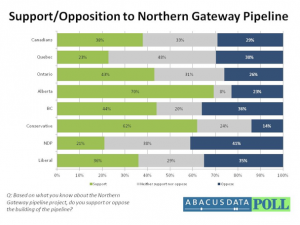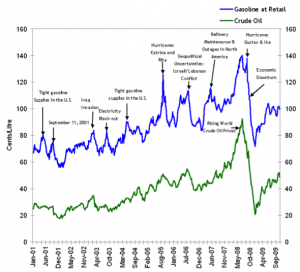This post originally appeared on the Carbon Talks blog
Debate over the approval of the Enbridge Northern Gateway pipeline is continuing to polarize Canadians. However the list of unresolved issues and conflicting information means that I’m not even sure what to believe. Will this project benefit the economy as Enbridge and the Federal Government suggest? Will First Nations groups ever approve the plan? Are oil tankers even legally allowed to sail off the BC coast? The more I read, the more I realize what we don’t know about the pipeline far outweighs what we do.
In a January 2012 poll by Abacus Data, Canadians almost equally supported or opposed the project at 38% and 29% respectively. Quebec led the charge in lack of support at only 23%, while BC is the province most opposed to the project at 36%. Unsurprisingly, the project has clear support from residents of Alberta.

In sifting through the details of the poll, we can see that those who support the pipeline do so for the potential economic benefits, while those who oppose it do so on environmental grounds. But for me, it’s the grey area in between that betrays this issue – what about those people who simply have no opinion at all?
It is this not-insignificant proportion of Canadians who are undecided that define the pipeline project. With so much conflicting information, how can I know whether to support, oppose, or even care?
For her own part, Canadian economist, and former Executive Director of VanCity Community Foundation, Robyn Allan has argued that the economic assumptions underlying support for the pipeline are fatally flawed. In her January 2012 report “An Economic Assessment of the Northern Gateway”, Allan states that “Northern Gateway represents an inflationary price shock which will have a negative and prolonged impact on the Canadian economy …” Essentially, she says that what economic benefit that will be seen will be limited to the oil companies themselves. The following graph, prepared by Natural Resources Canada, clearly show that oil prices have a direct effect on gasoline – and that affects all of us, regardless of whether we drive a car or not.

Ms. Allan’s views were presumably unwelcome in the energy sector; I can only assume it affected the National Energy Board’s refusal to grant her status to intervene at a hearing on Enbridge’s application. But then who to believe? Will the pipeline be an economic boom for Canada, or only benefit oil companies?
Then there’s the continuing issue of First Nation land rights. The fact is, virtually none of the 50 First Nations groups who have been offered equity in the project have agreed – though a deal was made between Gitxsan Chief Elmer Derrick and Enbridge, the decision seems to have been made unilaterally, and opposition among his community is incredibly strong. Though nobody can say with certainty what will happen in the coming year, it seems likely to me at least that negotiations will reach a stalemate. While some First Nations will perhaps yield to pressure and financial rewards, others will not. At the end of the day, there are only so many routes the pipeline can take, and avoiding traditional lands may be simply impossible. What are the realistic chances of ever reaching an agreement with all parties?

A final issue that is causing confusion among Canadians is the status of a moratorium on oil tanker traffic off British Columbia’s coast. For almost forty years, some Canadians believe there has been a de facto ban on tanker traffic sailing through Dixon Entrance, the Hecate Strait, and Queen Charlotte Sound. Yet in December 2009, the Canadian government stated their position, supported by the BC Chamber of Commerce, that “there is presently no moratorium on tanker traffic in the coast waters of British Columbia.” While the Prime Minister has compared coastal BC to Newfoundland where tanker traffic is allowed, Elizabeth May of the Green Party strongly disagrees, describing the BC coastline as “extremely sensitive to oil spills because of its physical features.” Again, who to believe? Do we have a moratorium, based on provincial-federal agreement, or do we not, due to lack of legislation? Is it safe for tankers to transit the BC coast?
With so much uncertainty over such a large scale project, perhaps it’s best to shift our focus elsewhere. Reducing energy usage, retrofitting our buildings, expanding public transportation, and stimulating a green economy – these are things that are already underway, things we can overwhelmingly agree upon. The oil can wait, until we know where everybody stands.
(Pipeline photo courtesy Bill & Vicky Tracey/Flickr, polling data courtesy of Abacus Data, oil and gas prices courtesy of Natural Resources Canada, tanker map courtesy of Living Ocean Society)

